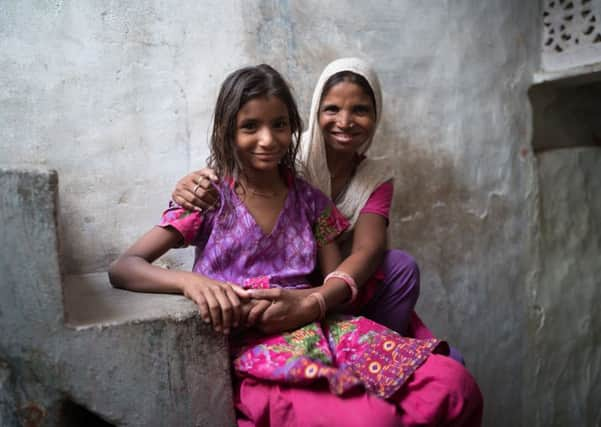Sally Foster-Fulton: Poverty has a woman’s face, say the UN – but there are people working to change that


Although our human interconnectedness means that poverty affects everyone negatively, women and children stand at the centre of that injustice. Poverty, unless the imbalance is redressed, is handed down with each new generation inheriting the challenges and burdens of an unjust system. This Christmas, we can share the gift of hope and solidarity.
Across the globe, brave mothers are battling against the odds to bring their children into the world, protecting and nurturing them. Mothers like Bibi Aisha in Afghanistan and Ranjita in India.
Advertisement
Hide AdAdvertisement
Hide AdBorn into India’s Dalit caste, Ranjita’s life has been condemned by discrimination and prejudice.
Dalit women – the most excluded of the caste system – account for 95 per cent of the 1.2 million ‘manual scavengers’. This caste-based and dehumanising practice involves removing human waste by hand from buckets or pit latrines. It is dangerous and filthy work which no one would ever choose to do. But poverty has stolen that most basic human right – choice.
When she was just nine years old Ranjita was forced, together with her mother, into manual scavenging work. Every day, in soaring temperatures, she would shovel human excrement by hand. She was shunned and ostracised – no one wanted to touch her for fear of being unclean.
Ranjita said: “They would drop bread on the plate I carried or throw it on the floor, they didn’t even hand it to me. They treated us worse than animals.”
Now a mother herself, her children gave her the courage and fighting spirit to break free from poverty. Thanks to Christian Aid’s local partner organisation, Ranjita has learned about her rights and opportunities and was helped to apply for a grant to start her tailoring business.
Ranjita can now afford to rent a room for her family rather than living in a slum and she can now afford to send her youngest child, Soniya, to school. She says that she and her children are happy now. “I am earning with dignity, and I am no longer treated like an animal,” she said.
Although Ranjita’s daily life is now far removed from the indignity of manual scavenging, we should not shield ourselves from the truth. Her life is not free from the challenges of systemic poverty.
But she is a change-maker and she is building a different life for her children. Her daughter will journey into a more equal future, equipped with gifts from her mother. We can be part of that transformation.
Advertisement
Hide AdAdvertisement
Hide AdBy working with local partners on the ground, Christian Aid helps mothers to begin to break the cycle of poverty by learning new skills to increase the household income and protect their families from harm.
In Afghanistan, decades of warfare, drought and civil unrest have created turmoil across communities. Women are often seen as second-class citizens, yet they are coming together to overcome social barriers and to drive change.
Our partner, RAADA, supports women to work independently and empower themselves, socially and economically. The group has initiated a number of different, life-changing programmes, such as raising awareness of women’s basic rights, creating women-led profit companies and training women to earn a livelihood.
RAADA has helped women like Bibi Aisha, a 25-year-old widow with two children who are seven and eight years old. Her family was displaced by the conflict and drought, but with RAADA’s support, she is determined to build a better life for herself and her family.
Poverty is an outrage against humanity. It robs people of their dignity and lets injustice thrive. But together we have the power to transform lives. It’s clear that when women are given the opportunity to thrive, they can transform our world, challenge inequality and seek justice.
This Christmas, if you’re going to make one donation this year, make it a life-changing one. Help mothers – like Ranjita and Bibi – escape poverty and create new hope and a new future for themselves and for their children.
Sally Foster-Fulton, head of team, Christian Aid.